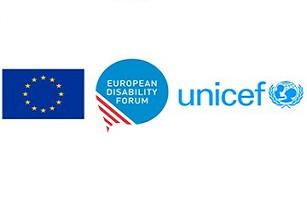
The European Union (EU) and UNICEF have broadened an important regional partnership that aims to protect children from violence and better include children with disabilities into society. Since 2011, UNICEF and the EU have been working together with countries currently in the process of joining the EU, such as Albania, Bosnia and Herzegovina, Serbia and Turkey. This partnership is now expanding to include Kosovo*, Montenegro, and the former Yugoslav Republic of Macedonia.
As of this year, the European Disability Forum (EDF) has joined the partnership.
Violence is a daily reality for thousands of children across southeastern Europe. Data** shows that more than 50 per cent of boys and girls aged 2-14 (and in some countries, more than 70 per cent) were exposed to at least one form of physical or psychological severe punishment by family members. Many children still find it extremely difficult to speak to outsiders when violence occurs within the family, let alone to seek protection and redress.
The situation of children with disabilities is even more complicated: they are often separated from their families, overrepresented in residential institutions, kept out of schools and are excluded from every day public life. They face prejudice, stigma and severe discrimination. Many are "invisible" – they are not represented in official data. They are also nearly four times more likely to experience violence.
The EU and UNICEF are contributing 5.89 million Euros – of which 5 million Euros come from the EU – for this regional partnership over the next three years, and have pledged to continue strongly advocating for each and every child to be protected from all forms of violence and to be an equal member of society.
”We believe that this partnership can make a real difference to the life of children in the region. We rely on UNICEF's and EDF's expertise and knowledge to influence policies that have an impact on children who are victims of violence and children with disabilities. At the same time, it is crucial to reach out to civil society and grass-root organisations working on child protection and to promote children inclusion in societies. Therefore, a large part of the funding will be devoted to support small civil society organisations to achieve real change and sustainable improvements of children's daily life and future perspective,” said Johannes Hahn, EU Commissioner for European Neighbourhood Policy and Enlargement Negotiations.
The partnership will contribute to improving coordination for multi-sectoral responses to violence against children. Key professionals will get better data, innovative tools, knowledge and the mechanisms to prevent or respond to violence, abuse and neglect and to narrow the social distance between children with and without disabilities.
”Each case of violence against children is one too many. It places their lives, health, safety, education and future at risk, and can mark them for life. We must speak out against violence and discrimination. It is unacceptable to use violence against children, especially against children who are the most vulnerable. We must find effective national and community-based solutions to protect the rights of all children and help seek redress for each and every child,” said Marie-Pierre Poirier, Regional Director and Special Coordinator for Refugee and Migrant Crisis in Europe.
Disability Persons Organisations including children with disabilities themselves will play a more vocal and active role in monitoring and influencing policies equal rights and social inclusion of children with disabilities.
”It is critical that children with disabilities are included all actions to tackle violence against children. This initiative is also very important in that it seeks to build the capacity and the involvement of organizations of persons with disabilities and other members of the civil society. EDF is happy to partner with UNICEF and the EU, to help make the rights of children with disabilities a reality in the region, as we aim to do in our work in Europe and globally,” said Yannis Vardakastanis, President of the European Disability Forum.
About UNICEF
UNICEF promotes the rights and wellbeing of every child, in everything we do. Together with our partners, we work in 190 countries and territories to translate that commitment into practical action, focusing special effort on reaching the most vulnerable and excluded children, to the benefit of all children, everywhere. Website: www.unicef.org/ceecis or www.unicef.org/eu
About EDF
The European Disability Forum is an independent NGO that represents the interests of 80 million Europeans with disabilities. EDF is a unique platform which brings together representative organisations of persons with disabilities from across Europe. EDF is run by persons with disabilities and their families. We are a front runner for disability rights. We are a strong, united voice of persons with disabilities in Europe. Website: www.edf-feph.org.
** Source: UNICEF Multiple Indicator Cluster Survey (MICS) reports, Serbia (2010); MICS Report on Roma Settlements in Serbia (2010); MICS reports, Albania, Bosnia and Herzegovina, the former Yugoslav Republic of Macedonia, Serbia (2005-2006): at http://mics.unicef.org/
Details
- Publication date
- 4 August 2016
- Author
- Directorate-General for Neighbourhood and Enlargement Negotiations
